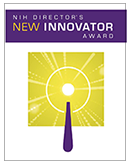Eligibility
- Eligibility
- Application Processnot completed
- After Submissionnot completed
- Award Managementnot completed
Disclaimer:
The information in these pages is meant to provide general guidance. Instructions and procedures outlined in the funding opportunity, SF424 Application Guide, and NIH Grants Policy Statement take precedence over any information provided and should be referred to for complete and comprehensive directions.
The New Innovator Award supports Early Stage Investigators (ESI) of exceptional creativity who propose bold and highly innovative research projects with the potential to produce a major impact on broad, important areas relevant to the mission of NIH. Preliminary data are not required. Any ESI with the skills, knowledge, and resources necessary to carry out the proposed research is invited to work with their organization to develop an application for support.
Applications are welcome in all research areas broadly relevant to the mission of NIH. These areas include, but are not limited to, the behavioral, medical, natural, social, applied, and formal sciences. Research may be basic, translational, or clinical. The primary requirements are that the research be highly innovative and have the potential for unusually broad impact.
Steps to Determine Your Eligibility
Fit NIH Mission and Goals
NIH seeks fundamental knowledge about the nature and behavior of living systems and the application of that knowledge to enhance health, lengthen life, and reduce illness and disability. The New Innovator Award welcomes all areas of research relevant to this mission, including (but not limited to) topics in behavioral, medical, natural, social, applied, and formal sciences. Research may be basic, translational, or clinical. The primary requirements are that the research be highly innovative and have the potential for unusually broad impact.
Fit the Purpose of the New Innovator Award
The award supports unusually creative investigators with highly innovative research ideas at an early stage of their career when they may lack the preliminary data required for an R01 grant application. The emphasis is on innovation and creativity; preliminary data are not required but may be included. No detailed, annual budget is requested in the application. The review process emphasizes the individual’s creativity, the innovativeness of the research approaches, and the potential of the project, if successful, to have a significant impact on an important biomedical or behavioral research problem.
Meet the Eligibility Requirements
Any eligible individual with the skills, knowledge, and resources necessary to carry out the proposed research as the Program Director/Principal Investigator (PD/PI) is invited to work with their institution to develop an application for support.
Only single PD/PI applications are allowed.
Early Stage Investigator Status
Applicants must meet the definition of an Early Stage Investigator (ESI) at the time of application submission. An ESI is a PD/PI who has completed their terminal research degree or end of post-graduate clinical training (whichever is later) within the past 10 years and who has not previously competed successfully as a PD/PI for a substantial NIH independent research award. See the Office of Extramural Research website for a list of grants that do not disqualify a PD/PI as a new investigator and for frequently asked questions about the NIH ESI policy.
An extension to the 10-year period may be granted under certain circumstances (e.g., childbirth, family care responsibilities, clinical loan repayment requirements, disability or illness, natural or other disaster, etc.). It may take several weeks for the review process for the request, so applicants should plan accordingly. Note: If an applicant is not identified as an ESI in the eRA Commons, it may result in the application not being reviewed. Applicants are responsible for reviewing and/or updating their degree information in their eRA Commons account in a timely fashion.
Independent Research Position
Applicants must hold an independent research position at a domestic (U.S.) institution by September 1st of the year when they will start their project period. An “independent research position” is a position that automatically confers eligibility to the investigator (based on institutional policy) to apply for R01 grants with appropriate institutional commitment of facilities for the conduct of the proposed research. Investigators still in training or mentored status (such as postdoctoral fellows) are not eligible to apply unless they have a written commitment from the institution stating they will be in an independent faculty position by September 1st of the year when they will start their project period. The commitment is certified by the institution's submission of the application.
Concurrent R01 Submission
Applicants may submit or have an NIH R01 or other equivalent grant application pending concurrently with their New Innovator Award application if it does not overlap substantially with their New Innovator Award application. However, if that pending grant becomes active prior to the New Innovator Award, the applicant is no longer eligible to receive the New Innovator Award.
Research Effort
Award recipients are required to commit at least three person-months (25%) of their research effort each year to activities supported by the New Innovator Award.
Get Additional Questions Answered
If you still have questions about your eligibility, check out the Frequently Asked Questions (FAQ) section and past Q&A webinar posted on the website. You can also contact NIH staff at [email protected].
More questions? Contact us at [email protected].



